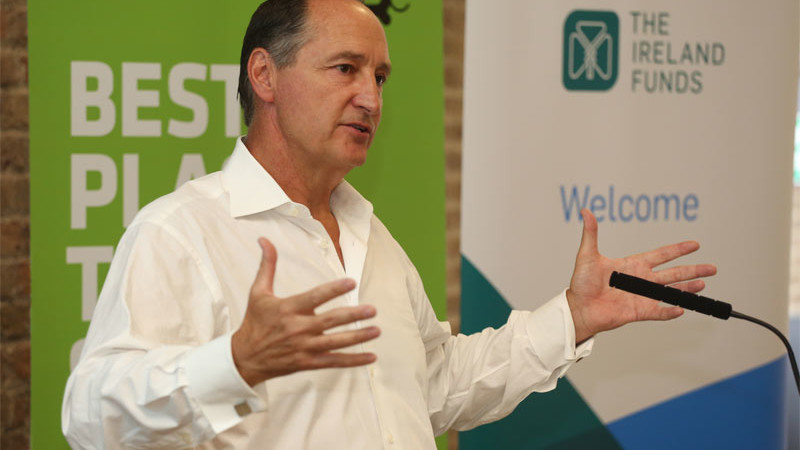William (Bill) S. McKiernan
William (Bill) S. McKiernan, is currently the President of WSM Capital LLC, a private equity fund focused on payment related businesses. He was the Founder of CyberSource Corporation and its Chairman and CEO for 16 years. He is an online commerce pioneer who led CyberSource to become one of the world’s leading e-commerce payment processing companies with over 300,000 customers processing over $100 billion per year. In 2010, CyberSource was acquired by Visa, Inc. for $2 billion. Bill is a Board Member of The Ireland Funds America and Chairs the Judging Panel of The Ireland Funds Business Plan Competition.
1. Why are you supporting The Ireland Funds Business Plan Competition?
I proposed the idea of a Business Plan Competition to the Ireland Funds in 2010 during the depths of the Irish recession. The economic climate in Ireland was pretty bleak at the time and it was clear that the biggest contribution The Ireland Funds could make to Ireland was to help create jobs. A job is the best philanthropy anyone can provide and every job starts with an entrepreneur. Government can provide some support but without a robust private sector the government eventually runs out of money. So entrepreneurship is critical to the long term success of Ireland and virtually every other country.
In terms of entrepreneurship, the big difference I see between Ireland and Northern California is the appetite for risk taking among young people. The Irish are as intellectually gifted, well trained, innovative, creative but they seem to be more risk averse than the young people in the US. Young people in Ireland should be encouraged to take risks. They need to be exposed to the entrepreneurial process and entrepreneurs who have been successful. They need to be more comfortable with failure and the lessons learned from it. The Business Plan Competition hopes to do that.
2. What is the book (or books) you’ve given most as a gift, and why? Or what are one to three books that have greatly influenced your life?
Every entrepreneur should read The Hard Thing About Hard Things by Ben Horowitz. It is an excellent primer on what it takes to be a successful startup CEO.
3. What purchase of $100 or less has most positively impacted your life in the last six months (or in recent memory)?
Spotify
4. How has a failure, or apparent failure, set you up for later success? Do you have a “favourite failure” of yours?
No, I don’t have a favorite failure. Failure sucks. But if you try to do hard things and have stretch goals you are going to fail. The important thing is to pick yourself back up and think about what you learned. Remember what Thomas Edison said, “I have not failed, I just found 10,000 ways that won’t work.” Entrepreneurs need to be comfortable with failure because it is inevitable. They also need to have an extraordinary capability to persevere. Starting a business is very hard. It is not for the faint of heart. The probability of failure, especially in the tech space, is very high. Your mindset needs to be that failure is not an option. There will be many times where quitting is the easy choice. You need to have the desire and stamina to go over, under, and through all the barriers you will face.
5. If you could have a gigantic billboard anywhere with anything on it — metaphorically speaking, getting a message out to millions or billions — what would it say and why? It could be a few words or a paragraph. (If helpful, it can be a quote: Are there any quotes you think of often or live your life by?)
Failure is not an option.
Family and health are the most important things in your life
6. What is one of the best or most worthwhile investments you’ve ever made? (Could be an investment of money, time, energy, etc.)
That’s easy. Starting CyberSource.
7. What is an unusual habit or an absurd thing that you love?
Peanut butter on an apple
8. In the last five years, what new belief, behaviour, or habit has most improved your life?
Lifting weights
9. What advice would you give to a smart, driven college student about to enter the “real world”? What advice should they ignore?
Work hard. There is no substitute for hard work. Get in early. Stay late. People will notice your work ethic. Work hard when you are young so you can relax when you are old.
Be genuine. Be yourself. Don’t try to be Steve Jobs. You are not Steve Jobs.
10. What are bad recommendations you hear in your profession or area of expertise?
Every entrepreneur will hear from people that their idea will never work. Sometimes the people are right, but you have to believe in your idea and it is your job to prove them wrong. Sometimes a bad idea just needs a little course correction to be a really good idea. Constantly look to refine and improve your idea based on customer feedback.
11. In the last five years, what have you become better at saying no to (distractions, invitations, etc.)? What new realizations and/or approaches helped? Any other tips
I just say no to the stuff I am unable to do. It’s better to be honest with people who ask you to do things that you will not be able to do and do well.
12. When you feel overwhelmed or unfocused, or have lost your focus temporarily, what do you do? (If helpful: What questions do you ask yourself?)
Make a list and prioritize the tasks.
